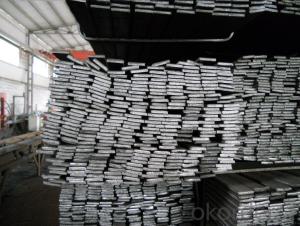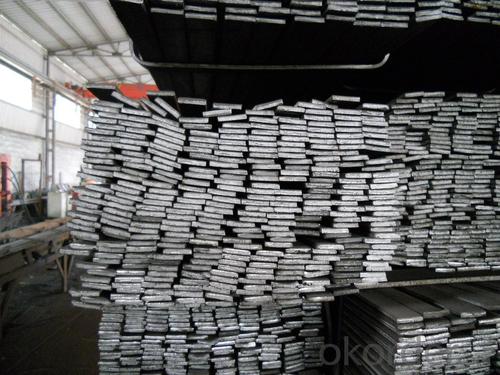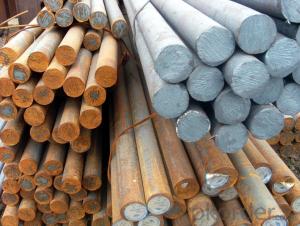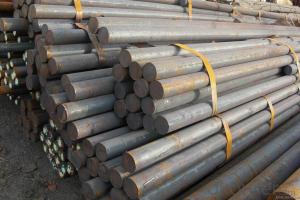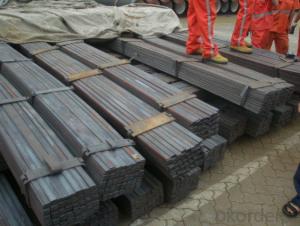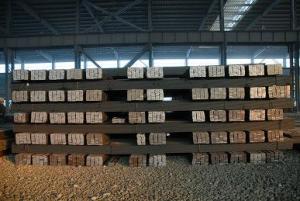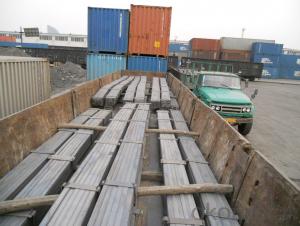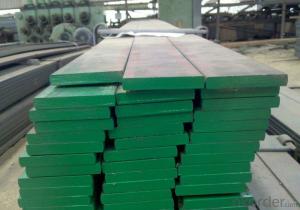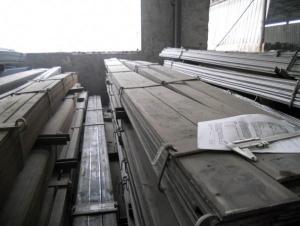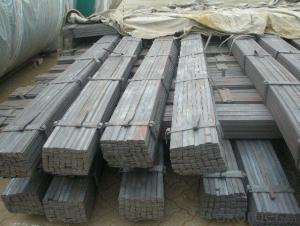Hot Rolled Spring Flat Bar
- Loading Port:
- China Main Port
- Payment Terms:
- TT or LC
- Min Order Qty:
- -
- Supply Capability:
- -
OKorder Service Pledge
OKorder Financial Service
You Might Also Like
Product Description:
OKorder is offering high quality Steel Flat Bar at great prices with worldwide shipping. Our supplier is a world-class manufacturer of steel, with our products utilized the world over. OKorder annually supplies products to European, North American and Asian markets. We provide quotations within 24 hours of receiving an inquiry and guarantee competitive prices.
Product Applications:
Steel Flat Bar are ideal for structural applications and are widely used in the construction of buildings and bridges, and the manufacturing, petrochemical, and transportation industries.
Product Advantages:
OKorder's Steel Flat Bar are durable, strong, and resist corrosion.
Main Product Features:
· Premium quality
· Prompt delivery & seaworthy packing (30 days after receiving deposit)
· Corrosion resistance
· Can be recycled and reused
· Mill test certification
· Professional Service
· Competitive pricing
Product Specifications:
Commodity: Mild Steel Flat Bar
Standard: GB;JIS
Material: Q195-235;SS400
Origin place: China
Thickness: 3mm-30mm
Width:20mm-200mm
Length: Max 12m
Certification: SGS/BV
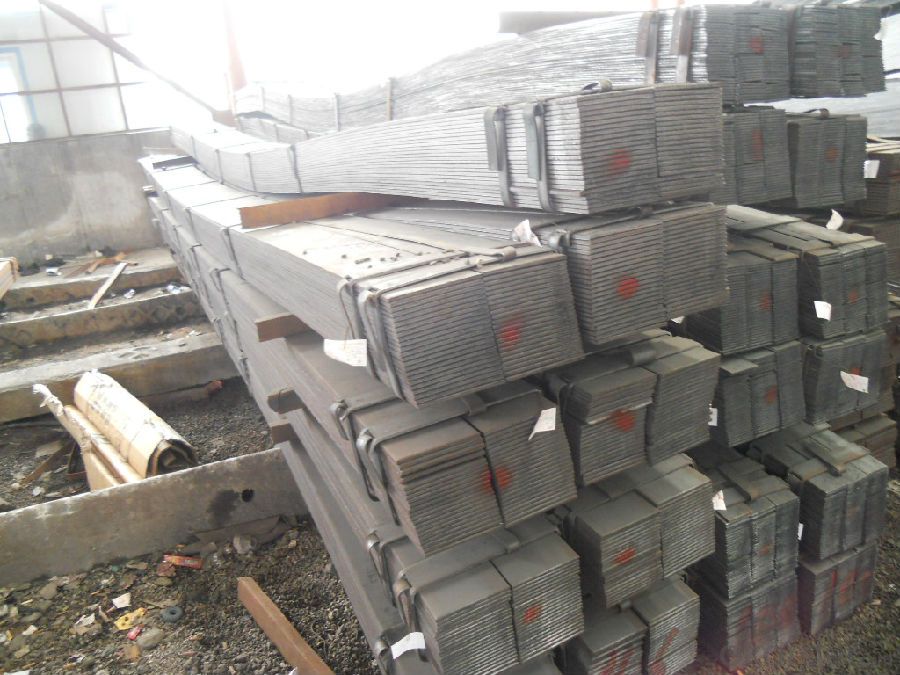
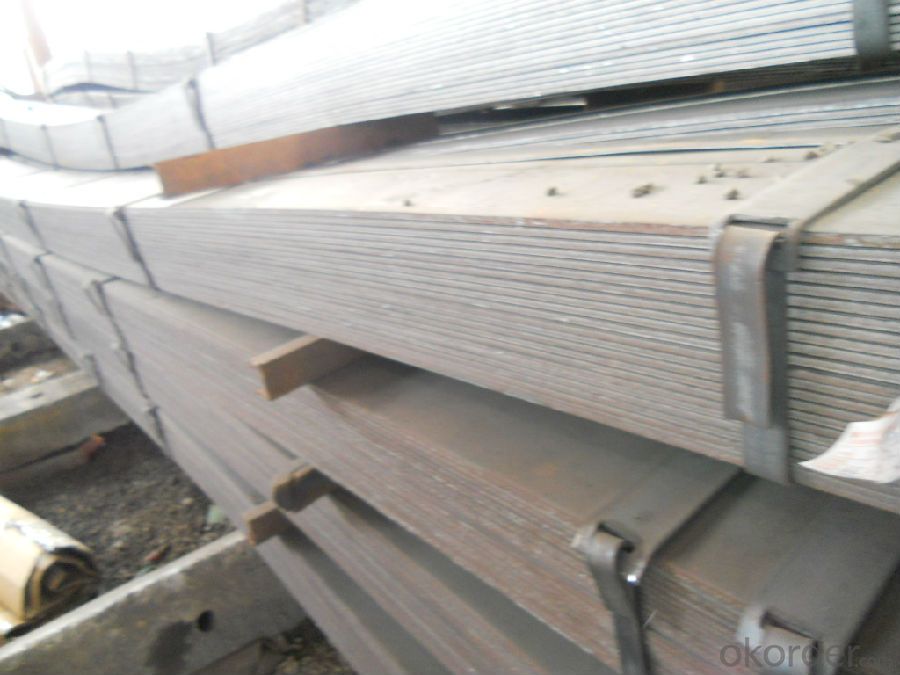
Usage/Applications of Steel Flat Bar
Widely used for construction, Machinery manufacturing, Iron tower steel structure, Shipbuilding; Steel grating, Staircase, Bridge, Viaduct, Railway spare parts, Boilers making etc.
Packaging & Delivery of Mild Steel Flat Bar
Packaging Details: The Mild Steel Flat Bars are packed in bundles and loaded in 20 feet/40 feet container, or shipped by bulk cargo ,also we can do as customer's requirements.
Delivery Details:30~45 days upon the receipt of buyer payment by T.T. or L/C.
Production Flow of Steel Flat Bar
The Mild steel flat bar is made through three processes:
1.Feeding the material: Feeding the row material (the steel plate) to Slitting Line.
2.Slitting:The steel plate would be slitted into expected width by lengthways cutter.
3. Leveled and cutting: The plat bar would be ground into level by the grinder and then cut into required length
FAQ:
Q1: Why buy Materials & Equipment from OKorder.com?
A1: All products offered byOKorder.com are carefully selected from China's most reliable manufacturing enterprises. Through its ISO certifications, OKorder.com adheres to the highest standards and a commitment to supply chain safety and customer satisfaction.
Q2: How do we guarantee the quality of our products?
A2: We have established an advanced quality management system which conducts strict quality tests at every step, from raw materials to the final product. At the same time, we provide extensive follow-up service assurances as required.
Q3: How soon can we receive the product after purchase?
A3: Within three days of placing an order, we will begin production. The specific shipping date is dependent upon international and government factors, but is typically 7 to 10 workdays.
Q4: What makes stainless steel stainless?
A4: Stainless steel must contain at least 10.5 % chromium. It is this element that reacts with the oxygen in the air to form a complex chrome-oxide surface layer that is invisible but strong enough to prevent further oxygen from "staining" (rusting) the surface. Higher levels of chromium and the addition of other alloying elements such as nickel and molybdenum enhance this surface layer and improve the corrosion resistance of the stainless material.
- Q: What are the main applications of special steel in the defense electronics?
- Special steel is extensively used in defense electronics for various applications. It is primarily used for manufacturing components that require high strength, superior corrosion resistance, and excellent electromagnetic shielding properties. Special steel is crucial for producing military-grade electronic enclosures, connectors, and circuit boards, ensuring the protection and reliability of sensitive electronic equipment in harsh environments. Additionally, it is utilized in the production of radar systems, missile guidance systems, and communication equipment, where its exceptional thermal stability, durability, and electromagnetic compatibility play a vital role in enhancing the performance and effectiveness of defense electronics.
- Q: How is special steel used in the production of consumer goods?
- Special steel is used in the production of consumer goods due to its exceptional strength, durability, and corrosion resistance. It is commonly employed in the manufacturing of kitchen appliances, cutlery, automotive parts, and electronics, ensuring high-quality and long-lasting products for consumers.
- Q: What are the different heat treatment furnaces used for special steel?
- There are several different heat treatment furnaces that are commonly used for special steel. These furnaces serve specific purposes and are designed to provide the required heating and cooling conditions for the steel to achieve the desired properties. One type of heat treatment furnace used for special steel is the annealing furnace. Annealing is a process that involves heating the steel to a specific temperature and then slowly cooling it to make it softer and more ductile. Annealing furnaces often have controlled atmospheres to prevent oxidation of the steel during the process. Another type of furnace used for special steel is the quenching furnace. Quenching is a process that involves rapidly cooling the steel to increase its hardness. Quenching furnaces are designed to provide the necessary cooling rate and often use specialized cooling mediums such as oil or water to achieve the desired results. Tempering furnaces are also commonly used for special steel. Tempering is a process that involves heating the steel to a specific temperature and then cooling it to improve its toughness and reduce brittleness. Tempering furnaces allow for precise temperature control during the process. In addition to these, there are also carburizing furnaces used for special steel. Carburizing is a process that involves introducing carbon into the steel's surface to increase its hardness. Carburizing furnaces have controlled atmospheres and are designed to provide the necessary temperatures and carbon-rich environments for the process. Overall, the different heat treatment furnaces used for special steel serve specific purposes such as annealing, quenching, tempering, or carburizing. These furnaces are designed to provide the required heating and cooling conditions to achieve the desired properties in the steel.
- Q: How is special steel used in the manufacturing of bearings?
- Due to its unique properties, special steel is utilized in the production of bearings, which are vital components employed in various industries. These bearings serve the purpose of reducing friction between moving parts, promoting smooth motion, and supporting heavy loads. The utilization of special steel guarantees exceptional performance and longevity. For the production of bearings, the preferred choice of special steel includes stainless steel and high-carbon chromium steel. This selection is based on the remarkable strength, hardness, and resistance to corrosion that these types of steel possess. These properties enable the bearings to endure heavy loads, withstand wear and tear, and operate effectively in challenging environments. The manufacturing process for bearings involves shaping and heat treatment. Initially, special steel is melted and cast into the desired form, typically a ring or a ball. Subsequently, the steel undergoes various heat treatment procedures like annealing, quenching, and tempering to enhance its hardness, toughness, and overall mechanical properties. This heat treatment ensures that the steel is adequately hardened to endure the stress and friction it will encounter during operation. Once the steel has undergone appropriate heat treatment, it is machined and ground to attain precise dimensions and smooth surfaces. This step is vital to ensure that the bearings possess the necessary tolerance and can rotate smoothly without any interference. Special steel's machinability and grindability simplify the achievement of the required accuracy and surface finish. Following the machining process, the bearings can be assembled with other components and lubricated to ensure proper lubrication and minimize friction. Special steel's corrosion resistance is particularly valuable at this stage as it shields the bearings from rust and degradation caused by moisture or aggressive environments. In conclusion, special steel is chosen for the production of bearings due to its exceptional strength, hardness, and corrosion resistance. These properties enable the bearings to withstand heavy loads, resist wear, and function effectively in challenging conditions. With the aid of its excellent machinability and grindability, special steel guarantees the attainment of the necessary precision and surface finish. Overall, special steel plays a pivotal role in the production of high-quality bearings that enable efficient and reliable motion in various industries.
- Q: Can special steel be used in the production of surgical implants?
- Yes, special steel can be used in the production of surgical implants. Special steel, such as stainless steel, is often preferred for surgical implants due to its high strength, corrosion resistance, and biocompatibility. It is commonly used for various types of implants, including orthopedic, dental, and cardiovascular implants.
- Q: How does special steel contribute to reducing product costs?
- Special steel contributes to reducing product costs in several ways. Firstly, special steel has a higher strength-to-weight ratio, meaning that less material is required to achieve the same strength and performance as traditional steel. This reduces the overall amount of steel needed for manufacturing, leading to cost savings. Additionally, special steel is known for its durability and resistance to wear, corrosion, and heat, thus reducing the need for frequent repairs or replacements. This prolongs the lifespan of products, resulting in reduced maintenance and replacement costs. Furthermore, special steel often allows for more precise and efficient manufacturing processes, such as forging or machining, which can lower production costs by minimizing waste and improving productivity. Overall, the use of special steel in product manufacturing helps to optimize material usage, enhance durability, and streamline production, consequently reducing product costs.
- Q: How does special steel perform in hot forging processes?
- Special steel is specifically engineered to endure high temperatures and excel in hot forging procedures. When subjected to extreme heat, special steel retains its strength and hardness, rendering it perfect for utilization in hot forging applications. One of the principal benefits of special steel in hot forging lies in its superb heat resistance. It can endure elevated temperatures without compromising its structural integrity, guaranteeing the preservation of its desired properties throughout the forging process. This enables the production of forged components with consistent quality and dimensional accuracy. Moreover, special steel demonstrates commendable thermal conductivity, aiding in the even distribution of heat during forging. This facilitates efficient heating and diminishes the likelihood of localized overheating or cold spots. The uniform distribution of heat also contributes to a homogeneous grain structure, enhancing the overall strength and mechanical properties of the forged parts. Furthermore, special steel possesses exceptional wear resistance and toughness, even in elevated temperatures. This ensures that the steel can withstand the substantial forces and pressures involved in the hot forging process without succumbing to deformation or failure. The combination of high strength, wear resistance, and toughness allows for the production of forged components capable of enduring heavy loads and harsh operating conditions. Additionally, special steel lends itself to easy machining and shaping, enabling the forging of intricate designs and complex forms. This versatility makes it suitable for a broad range of hot forging applications, including automotive parts, industrial machinery components, and aerospace components. In conclusion, special steel excels in hot forging processes. Its heat resistance, thermal conductivity, wear resistance, toughness, and machinability establish it as an ideal material for the production of high-quality, long-lasting, and intricate forged components.
- Q: How does special steel perform in aerospace applications?
- Special steel is widely used in aerospace applications due to its exceptional performance and unique properties. One of the key reasons for its usage is its high strength-to-weight ratio, which is crucial in the aerospace industry where weight reduction is a primary concern. Special steel alloys exhibit superior strength, allowing them to withstand the extreme conditions encountered during flight, such as high temperatures, vibrations, and pressure changes. Additionally, special steel possesses excellent resistance to corrosion, making it an ideal choice for aerospace applications where exposure to moisture and various chemicals is common. Its corrosion resistance ensures the longevity and durability of critical components, reducing maintenance and replacement costs. Furthermore, special steel offers excellent fatigue resistance, meaning it can withstand repeated loading and unloading cycles without experiencing deformation or failure. This property is vital in aerospace applications where components are subjected to cyclic stresses and must maintain their integrity over prolonged periods. Moreover, special steel alloys can be easily fabricated and machined, allowing for the production of complex and precise aerospace components. The ease of fabrication ensures efficient manufacturing processes and the ability to create intricate designs, which is essential for optimizing performance and aerodynamics. Overall, special steel's exceptional strength, corrosion resistance, fatigue resistance, and ease of fabrication make it an invaluable material in aerospace applications. Its utilization in critical components, such as turbine blades, landing gears, and structural elements, ensures the safety, reliability, and efficiency of aerospace systems.
- Q: How does special steel contribute to the efficiency of industrial equipment?
- Special steel contributes to the efficiency of industrial equipment in several ways. Firstly, special steel alloys have superior strength and hardness properties compared to regular steel, allowing for the construction of more durable and robust equipment. This increased strength helps to prevent wear and tear, reducing the need for frequent repairs or replacements, thereby improving the overall efficiency of the equipment. Furthermore, special steel alloys often exhibit excellent heat and corrosion resistance, making them ideal for applications in high-temperature or corrosive environments. This resistance to extreme conditions ensures that the equipment can operate reliably and efficiently in such challenging settings without compromising performance or safety. Special steel alloys also offer improved machinability, allowing for more precise and intricate manufacturing of industrial equipment components. This enhanced machinability ensures that the equipment is built to precise specifications, resulting in better overall performance and efficiency. Moreover, special steel alloys can be designed to possess specific characteristics, such as high conductivity or magnetic properties, making them ideal for applications where electrical conductivity or magnetism is required. This customization capability of special steel allows for the development of industrial equipment that is tailored to specific needs, maximizing efficiency and effectiveness. Overall, the use of special steel in industrial equipment significantly contributes to its efficiency by providing enhanced strength, durability, heat and corrosion resistance, improved machinability, and customization options. These properties not only increase the lifespan of the equipment but also improve its performance, reliability, and safety, ultimately leading to enhanced operational efficiency and productivity in industrial settings.
- Q: Can special steel be welded?
- Yes, special steel can be welded.
Send your message to us
Hot Rolled Spring Flat Bar
- Loading Port:
- China Main Port
- Payment Terms:
- TT or LC
- Min Order Qty:
- -
- Supply Capability:
- -
OKorder Service Pledge
OKorder Financial Service
Similar products
Hot products
Hot Searches
Related keywords
